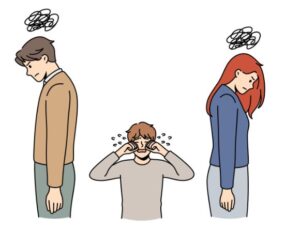How Should I Talk to My Children About Separation and Divorce?

Telling your children that you are planning on getting a divorce can be one of the most difficult discussions you will ever have. However, if you are planning on separating from your spouse, it is important to tell your kids once you have made the decision before they learn about it from someone else. The last thing you want is for your children to hear about the divorce from another family member or friend.
Divorce can be stressful and emotional for everyone involved. It can be especially upsetting and confusing for children. By being a good listener, providing reassurance, and making your kids your top priority, you can minimize the stress your children feel during the divorce process and help them cope with their new reality.
How Much Information Should I Give My Child About the Divorce?
It’s important to consider how much information to give your children regarding your divorce in the early stages of the process. You should think long and hard about what information to disclose and what to withhold.
- Consider your child’s age – News of a divorce will affect children of different ages in distinct ways. If your child is younger, they might not need as much detail about why their parents are separating. Older children, such as teenagers, will probably have more questions and need more information.
- Be practical – Make sure your child understands the practical impact of the divorce. Explain what their living arrangements will be like and describe other changes, but don’t get too bogged down in the details.
- Be truthful – Whatever you decide to share with your kids, let it be the truth. Always be honest when discussing the divorce with your kids.
When you address the divorce with your children, it is best if you and your spouse can present a united front and have agreed on the terms of the divorce in advance. Once you have a plan, try to follow it.
When you sit your children down to discuss the divorce, both spouses should be present. Try not to criticize one another in front of your children. Don’t say negative things to try to turn your children against their other parent. Be respectful of your spouse by letting them explain their reasons for separating.
Normal Reactions to Divorce or Separation
 Some kids may navigate a divorce with relative ease. Others may find it challenging to adjust to the separation and the absence of one parent.
Some kids may navigate a divorce with relative ease. Others may find it challenging to adjust to the separation and the absence of one parent.
Common reactions to divorce include:
- Anger: Your children may be angry with you for upsetting their present way of life.
- Minor depression: While most kids will be sad about a separation, some might feel despair or hopelessness, which are symptoms of depression.
- Stress and anxiety: Children may feel stress and anxiety as they adjust to their new normal.
You should be on the lookout for more extreme reactions to divorce, including insomnia, lack of appetite, drug and alcohol abuse, emotional withdrawal, and self-harm. If you notice any red flags, you should make sure to give your child the additional support they need to cope.

















